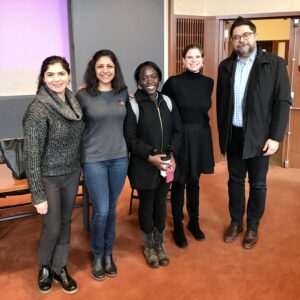 Of the four students whose work is represented in the Harvard Law Review’s April 2018 “Developments in the Law” issue, three are former students in the Cyberlaw Clinic and all have taken classes with our staff. The issue of the Law Review focuses on challenges posed by the vast amount of personal information that individuals now store digitally and with third party technology companies. The student authors, Audrey Adu-Appiah, Chloe Goodwin, Vinitra Rangan, and Ariel Teshuva, presented on their work to a packed room on Thursday, April 18, at the Law School, followed by a conversation moderated by Chris Bavitz.
Of the four students whose work is represented in the Harvard Law Review’s April 2018 “Developments in the Law” issue, three are former students in the Cyberlaw Clinic and all have taken classes with our staff. The issue of the Law Review focuses on challenges posed by the vast amount of personal information that individuals now store digitally and with third party technology companies. The student authors, Audrey Adu-Appiah, Chloe Goodwin, Vinitra Rangan, and Ariel Teshuva, presented on their work to a packed room on Thursday, April 18, at the Law School, followed by a conversation moderated by Chris Bavitz.
Adu-Appiah presented on her Note, “The Video Privacy Protection Act as a Model Intellectual Privacy Statute,” arguing that while the VPPA is often seen as niche legislation and has been somewhat compromised by recent amendments, as originally passed it could be a strong model for a more general intellectual privacy regime which would apply to written materials as well as audio-visual ones.
Summarizing her Note, “Cooperation or Resistance? The Role of Tech Companies in Government Surveillance,” Goodwin argued that the two narratives that dominate discussion of tech companies’ involvement in government surveillance — that they are either doormats or bulwarks, depending on your perspective — is a vast oversimplification. Goodwin calls for new regulation that will align these companies’ incentives with those of their users.
Teshuva presented on a related topic to Goodwin’s, but focused particularly on the issue of standing to challenge legitimate surveillance of foreign individuals that sweeps up the communication of people located in the U.S., which would otherwise require a warrant from law enforcement. Her Note, “Standing, Surveillance, and Technology Companies,” points out that the present state of the law makes it extremely difficult for individuals to gain standing to challenge these practices, and vests the protection of their interests largely in the tech companies whose platforms they are using.
In what she described as a “hard right turn,” Rangan looked at how trusts and estates law is being impacted by these same developments. In her Note “What is an ‘Electronic Will’?” she argued that state legislatures need to parse the various types of electronic wills in order to instruct probate courts on how to properly evaluate this evidence of testators’ intent.
Following the students’ presentations, Professor Bavitz led an engaging discussion, highlighting issues such as the role of individuals in effecting change that drew connections between all four of the Notes presented.
